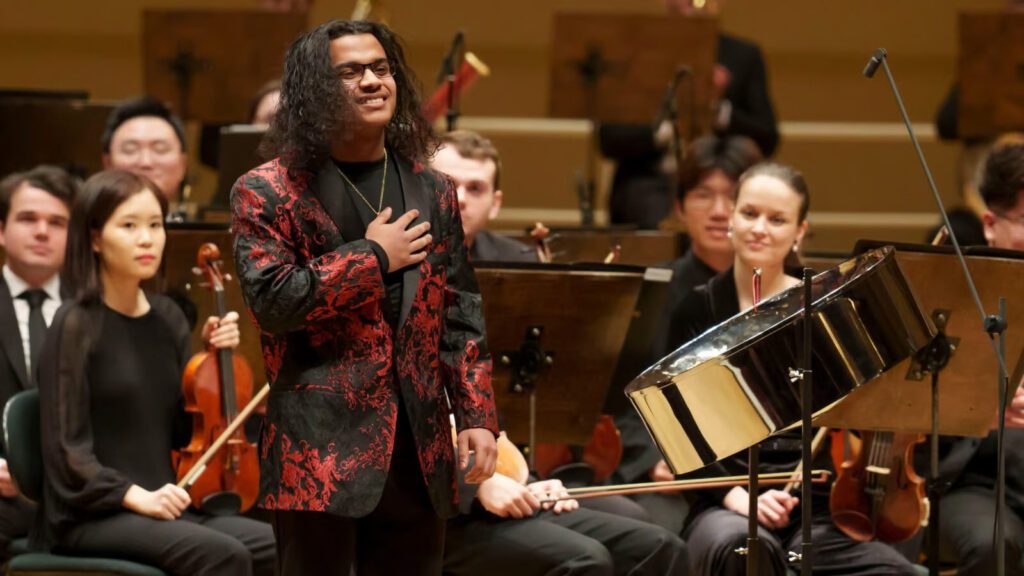Pannist Teague-Núñez wins Chicago music competition

Trinidad and Tobago-born, US-based professor and pannist Liam Teague wrote A Visit From Hell, an orchestral composition, at 15.
It was with this composition that his 16-year-old son Jaden Teague-Núñez won the Crain-Maling Chicago Symphony Orchestra (CSO) Young Artists Competition in its final round on February 24.
The competition, its website says, is a “prestigious concerto competition for Illinois’ top young soloists.”
Applicants audition live at Symphony Centre for a distinguished panel of judges and, after a preliminary round, three finalists are selected to perform in Orchestra Hall, accompanied by the Civic Orchestra of Chicago.
The winner is featured for the following season as soloist with members of the Chicago Symphony Orchestra as part of CSO School and Family Concerts.
It was the first time pan featured in the competition, and the first time a soloist won playing the instrument. The other finalists were 16-year-old Elyse Schlesinger and 15-year-old Chloe Nam.
In a WhatsApp interview, Teague-Núñez said he was interested in the competition before, but was unable to enter at that time.
Teague-Núñez is also the son of former Panamanian National Symphony principal viola Lorena Núñez. He lives in Illinois and is a student at DeKalb High School.
When he saw percussion instruments were to be featured in the 2024 competition, Teague- Núñez decided to enter.
A WMFT article said the competition operates on a three-year instrument cycle, rotating between piano, strings and winds/brass/percussion/harp.
When he entered, winning was not on his mind: he was entering “just for the experience,” he said.
A multi-instrumentalist, he also plays other percussion instruments like marimba and the snare drum, but felt this was an opportunity to show the pan and its versatility.
Having made history as the first pannist to enter and win, he described the experience as cool.
“I was just coming into it for the experience, and, honestly, I did not expect to win the whole thing. It is really an amazing feeling to be playing with this legendary orchestra,” he said.
For his father too, it was an “amazing feeling” seeing his son win with his composition.
The win was not only for their family but he also looked at the bigger picture and hopes it leads to more opportunities for pannists, he said, “Because still people around the world are not as cognisant of the various musical possibilities of the instrument. They may be aware that it can play folk music, calypso music, which is all great, but they have not heard it playing classical music, jazz and other types of musical genres.”
Teague also thinks it could lead to greater earning opportunities for the instrument’s players
if more pannists play with orchestras across the globe. “When I was growing up, my initial musical heroes were classical musicians and these were all great classical soloists who would perform all over the world – on a consistent basis – with symphony orchestras.
“And so that inspired me. Even though I have played with symphony orchestras myself, it does not happen as consistently as I’d like, and this is the thing I would also like to see for pan musicians, not just doing classical music, but if that is something they are passionate about, certainly, so they can be gainfully employed year-round.”
Teague said some of the major classical music soloists are performing with the major orchestras, week in, week out all over the world, and this, he believed, could lead to more earnings for the pan fraternity.
It took Teague-Núñez an hour or two each day to prepare for the competition.
What also helped was that he had learned the piece while in sixth or seventh grade (11- 12 years old) and had recently played the piece while participating in another competition with the Kishwaukee Symphony Orchestra.
As part of his prize, Teague- Núñez will appear on Chicago radio station WFMT’s programme Introductions on April 20, when he will perform an hour-long solo recital, including his winning piece and some piano pieces. He also hopes to show his versatility by playing classical and jazz music and some calypsoes.
He will also appear at two concerts with the Chicago Symphony Orchestra as part of his prize.
He plans to pursue a music career not only because he loves being a soloist but also because he wants to follow in his father’s footsteps.
Ultimately, he wants to expose pan and its many capabilities to different audiences. Also like his father, Teague-Núñez wants to compose and arrange for steel-bands. Currently he is arranging Russian composer Tchaikovsky’s Romeo and Juliet for pan, which he hopes to premiere soon.
Teague said even though he has lived in the US for most of his life, having moved there at 19 to study, his heart is still in Trinidad and Tobago and the Caribbean and he hopes to give back more, especially to the nation’s youth.
He hopes to do so with Teague-Núñez at his side.


Comments
"Pannist Teague-Núñez wins Chicago music competition"